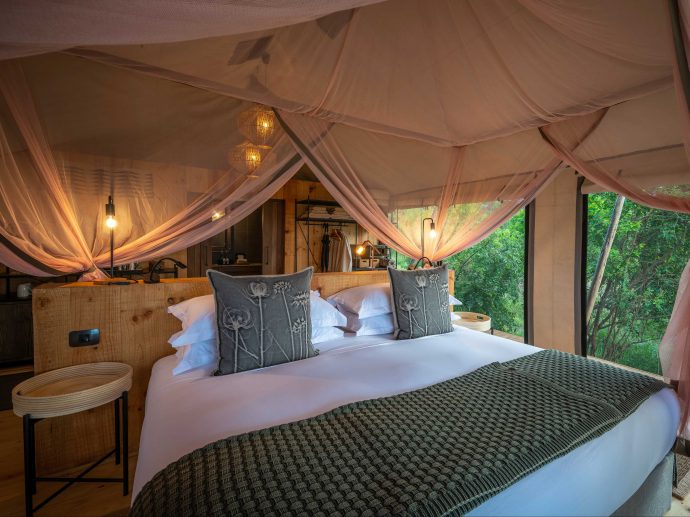Categories more
- Adventures (17)
- Arts / Collectables (15)
- Automotive (37)
- Aviation (11)
- Bath, Body, & Health (77)
- Children (6)
- Cigars / Spirits (32)
- Cuisine (16)
- Design/Architecture (22)
- Electronics (13)
- Entertainment (4)
- Event Planning (5)
- Fashion (46)
- Finance (9)
- Gifts / Misc (6)
- Home Decor (45)
- Jewelry (41)
- Pets (3)
- Philanthropy (1)
- Real Estate (16)
- Services (23)
- Sports / Golf (14)
- Vacation / Travel (59)
- Watches / Pens (14)
- Wines / Vines (24)
- Yachting / Boating (17)
Published
06/13/2019 by Wilderness SafarisWilderness Safaris has officially opened its new camp, Magashi, overlooking scenic Lake Rwanyakazinga in the north-east of Rwanda’s wildlife-rich Akagera National Park. Launched in partnership with conservation non-profit African Parks and the Rwanda Development Board (RDB), both of which manage the national park, Magashi offers life-changing journeys to this remarkable location – journeys that are strongly rooted in a shared core purpose: to help conserve Rwanda’s last protected savannah ecosystem and threatened species like the East African subspecies of black rhino and rare shoebill stork.
“We are thrilled with our elegant new camp, which is looking incredible thanks to the collective efforts of our Rwanda team and lead designers, Caline Williams-Wynn and Nilfah Adams from Artichoke. Our Magashi team has already started to work their magic and exceed our guests’ expectations, and we are looking forward to sharing the area’s wonders with many more guests in the future”, commented Ingrid Baas, Wilderness Safaris Rwanda General Manager.
Comprising a traditional East African “safari under canvas” feel, Magashi’s six airy tented suites and main guest areas have been designed to take full advantage of the beautiful wilderness surrounds and tranquil, uninterrupted views over Lake Rwanyakazinga. Paying homage to Rwandan culture through locally-inspired interior design and architecture, Magashi truly celebrates the country’s inspiring renaissance – a huge part of which has seen the reinvention of traditional textiles and ceremonies in a modern context.
“Akagera has undergone a remarkable transformation over the past nine years, through which it has emerged as one of Africa’s greatest conservation success stories. Our partnership with the RDB has seen poaching essentially eliminated, wildlife recovered including bringing back lions and rhinos to the park, and tourism is helping Akagera become 80% self-financing, which also supports local communities”, said Jes Gruner, Park Manager of Akagera National Park. “Together with Wilderness Safaris we hope to further realise the enormous potential of Akagera, which is why we are delighted to see the exquisite Magashi Camp open its doors, and we look forward to welcoming its guests to the park to experience this extraordinary tale of restoration first-hand”.
“It has been very rewarding to watch the camp come to life through the craftsmanship of our local Rwandan artists, overseen by Artichoke’s expertise”, Ingrid added. “In addition to offering appropriately luxurious accommodation, warm local hospitality and a range of exciting safari activities, we are very proud of the camp’s ultra-light footprint; what’s more, it is 100% solar powered and completely single-use plastic free. This forms part of our 4Cs sustainability ethos of Commerce, Community, Culture and Conservation, which is at the heart of our Magashi offering”.
Situated in north-eastern Akagera, Magashi offers exceptional game-viewing, including thrilling leopard and lion sightings and a range of plains game, from buffalo and hippo to zebra, Defassa waterbuck, impala, eland, Masai giraffe and topi; Akagera’s almost 500 bird species include lifers such as the papyrus gonolek. Guests will be able to explore the concession on expertly-guided day and night game drives, boating trips and walks. In 2015, African Parks reintroduced lions to the park after a 20-year absence, and reintroduced the black rhinoceros in 2017, making this Rwanda’s only home to Africa’s iconic savannah megafauna.
“Akagera provides one of the most scenic and biodiverse savannah experiences in East Africa, and we are confident that in addition to offering our guests a life-changing journey with purpose, Magashi will help drive sustainable ecotourism to the Park, positively contributing to conservation and the empowerment of our neighbouring communities”, Ingrid concluded.

















